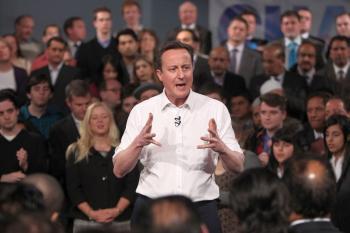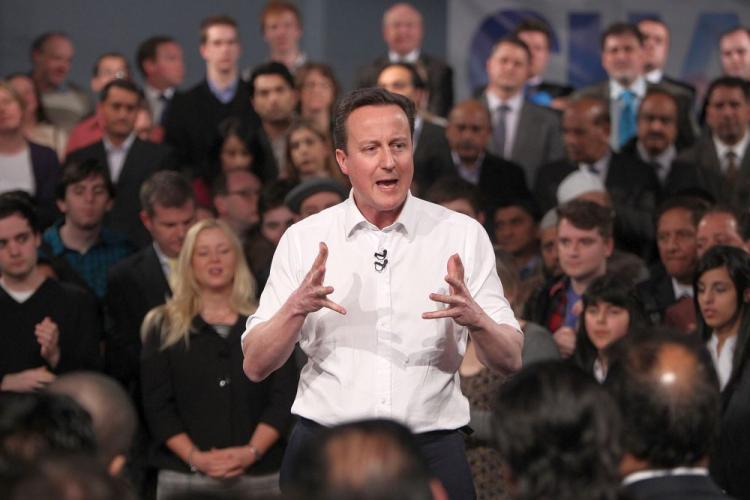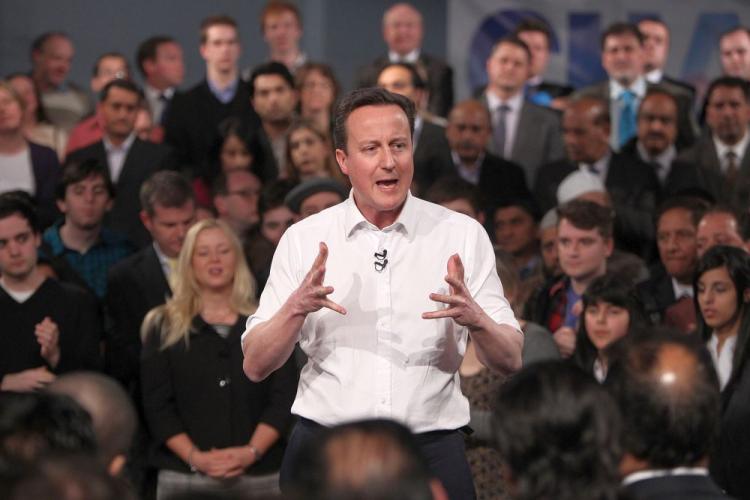LONDON—The fight for the most closely-contested British election in a generation has officially begun. Gordon Brown on Tuesday formally asked the Queen to dissolve Parliament to make way for a general election on May 6.
Before the starting gun had even been fired, Conservative leader David Cameron was off and running; jogging for 35 minutes in a display of vigor and energy before heading to a carefully selected location for his opening campaign speech just ahead of the prime minister’s announcement.
The fact that the election would be on May 6 was in PM Gordon Brown’s words “the worst kept secret for years.” He appealed to voters for a mandate to allow the country’s economic recovery to be completed in his safe hands, flanked outside Downing Street by dozens of senior government figures in a carefully crafted visual message.
The scene was in contrast to previous election announcements, made by prime ministers standing alone, reflecting the current Labor tactic of playing to what they believe is the strength of experience across the board in the incumbent party, and of playing down a perceived weakness: the unpopularity of the prime minister himself.
For his part, David Cameron stood clearly apart from the current government with the Houses of Parliament in the background, the carefully choreographed image chiming with his message of change and the notion of an outsider coming in to clean up the mess of politics and the mess left by 13 years of a Labor government—in particular Gordon Brown.
“This country deserves a lot better than five more years of Gordon Brown,” he told a crowd of supporters.
“It’s the most important general election for a generation. It comes down to this: You don’t have to put up with another five years of Gordon Brown.”
Cameron urged his party supporters to tell the voters of “a modern Conservative alternative that is about voting for hope, voting for optimism, voting for change.”
He said a Conservative government would work to make people feel proud of Parliament again, following the expenses scandal.
He promised to “shake things up,” by reforming the House of Commons, scrapping ID cards, abolishing regional assemblies, cutting and then freezing ministerial pay, and slashing bureaucracy.
Cameron said Britain needed “a new economic model” following “the biggest boom and bust for a generation;” a clear dig at Brown who presided over the economy—and the accumulation of debt—in boom-time for 10 years as chancellor.
The Labor Party has always sought to distance the prime minister’s time as chancellor from the global economic crisis, emphasizing the global nature of the crisis and its provenance in the United States. Instead they have sought to emphasize the economic credentials of the prime minister in general, his role in finding an international solution to the crisis, and the fact that the country has emerged into calmer economic waters on his watch.
This was the message the prime minister emphasized as he returned from his meeting with the Queen.
“Britain is on the road to recovery and nothing we do should put that recovery at risk,” said Brown.
“Over the next few weeks I will go round the country—the length and breadth of our land—and I will take to the people a very straightforward and clear message—Britain is on the road to recovery and nothing we do should put that recovery at risk.
“Get the big decisions right—as we did in the last 18 months since the world recession—and jobs, prosperity, and better standards of living will result. Get the big decisions wrong and the lives of hundreds of thousands of people are diminished as a result.”
Pundits are struggling to predict a winner for the election. Shifting and conflicting polls, and the fallout from the expenses scandal have made election predictions almost impossible.
The expenses scandal has caused great anger amongst the public, with the reputations of individual politicians faring very differently in the fallout. In a recent poll two out of five people said that they would rather vote for a candidate from a party they didn’t like than for a candidate who had been fiddling expenses.
With polls in recent weeks putting the Conservative Party only several points ahead of the Labour Party, the nation is also facing the possibility of a minority parliament. That possibility has pushed to the fore the leader of the Liberal Democrat Party, Nick Clegg, who would become the “King-maker” in the event of a hung parliament.
Kicking off his own campaign on Tuesday, Clegg steered clear of the role the party would play in a hung parliament, instead emphasizing his party as a political force in its own right, and saying the election will not be the usual “two-horse race” between Labour and the Conservatives.
Before the starting gun had even been fired, Conservative leader David Cameron was off and running; jogging for 35 minutes in a display of vigor and energy before heading to a carefully selected location for his opening campaign speech just ahead of the prime minister’s announcement.
The fact that the election would be on May 6 was in PM Gordon Brown’s words “the worst kept secret for years.” He appealed to voters for a mandate to allow the country’s economic recovery to be completed in his safe hands, flanked outside Downing Street by dozens of senior government figures in a carefully crafted visual message.
The scene was in contrast to previous election announcements, made by prime ministers standing alone, reflecting the current Labor tactic of playing to what they believe is the strength of experience across the board in the incumbent party, and of playing down a perceived weakness: the unpopularity of the prime minister himself.
For his part, David Cameron stood clearly apart from the current government with the Houses of Parliament in the background, the carefully choreographed image chiming with his message of change and the notion of an outsider coming in to clean up the mess of politics and the mess left by 13 years of a Labor government—in particular Gordon Brown.
“This country deserves a lot better than five more years of Gordon Brown,” he told a crowd of supporters.
“It’s the most important general election for a generation. It comes down to this: You don’t have to put up with another five years of Gordon Brown.”
Cameron urged his party supporters to tell the voters of “a modern Conservative alternative that is about voting for hope, voting for optimism, voting for change.”
He said a Conservative government would work to make people feel proud of Parliament again, following the expenses scandal.
He promised to “shake things up,” by reforming the House of Commons, scrapping ID cards, abolishing regional assemblies, cutting and then freezing ministerial pay, and slashing bureaucracy.
Cameron said Britain needed “a new economic model” following “the biggest boom and bust for a generation;” a clear dig at Brown who presided over the economy—and the accumulation of debt—in boom-time for 10 years as chancellor.
The Labor Party has always sought to distance the prime minister’s time as chancellor from the global economic crisis, emphasizing the global nature of the crisis and its provenance in the United States. Instead they have sought to emphasize the economic credentials of the prime minister in general, his role in finding an international solution to the crisis, and the fact that the country has emerged into calmer economic waters on his watch.
This was the message the prime minister emphasized as he returned from his meeting with the Queen.
“Britain is on the road to recovery and nothing we do should put that recovery at risk,” said Brown.
“Over the next few weeks I will go round the country—the length and breadth of our land—and I will take to the people a very straightforward and clear message—Britain is on the road to recovery and nothing we do should put that recovery at risk.
“Get the big decisions right—as we did in the last 18 months since the world recession—and jobs, prosperity, and better standards of living will result. Get the big decisions wrong and the lives of hundreds of thousands of people are diminished as a result.”
Pundits are struggling to predict a winner for the election. Shifting and conflicting polls, and the fallout from the expenses scandal have made election predictions almost impossible.
The expenses scandal has caused great anger amongst the public, with the reputations of individual politicians faring very differently in the fallout. In a recent poll two out of five people said that they would rather vote for a candidate from a party they didn’t like than for a candidate who had been fiddling expenses.
With polls in recent weeks putting the Conservative Party only several points ahead of the Labour Party, the nation is also facing the possibility of a minority parliament. That possibility has pushed to the fore the leader of the Liberal Democrat Party, Nick Clegg, who would become the “King-maker” in the event of a hung parliament.
Kicking off his own campaign on Tuesday, Clegg steered clear of the role the party would play in a hung parliament, instead emphasizing his party as a political force in its own right, and saying the election will not be the usual “two-horse race” between Labour and the Conservatives.







